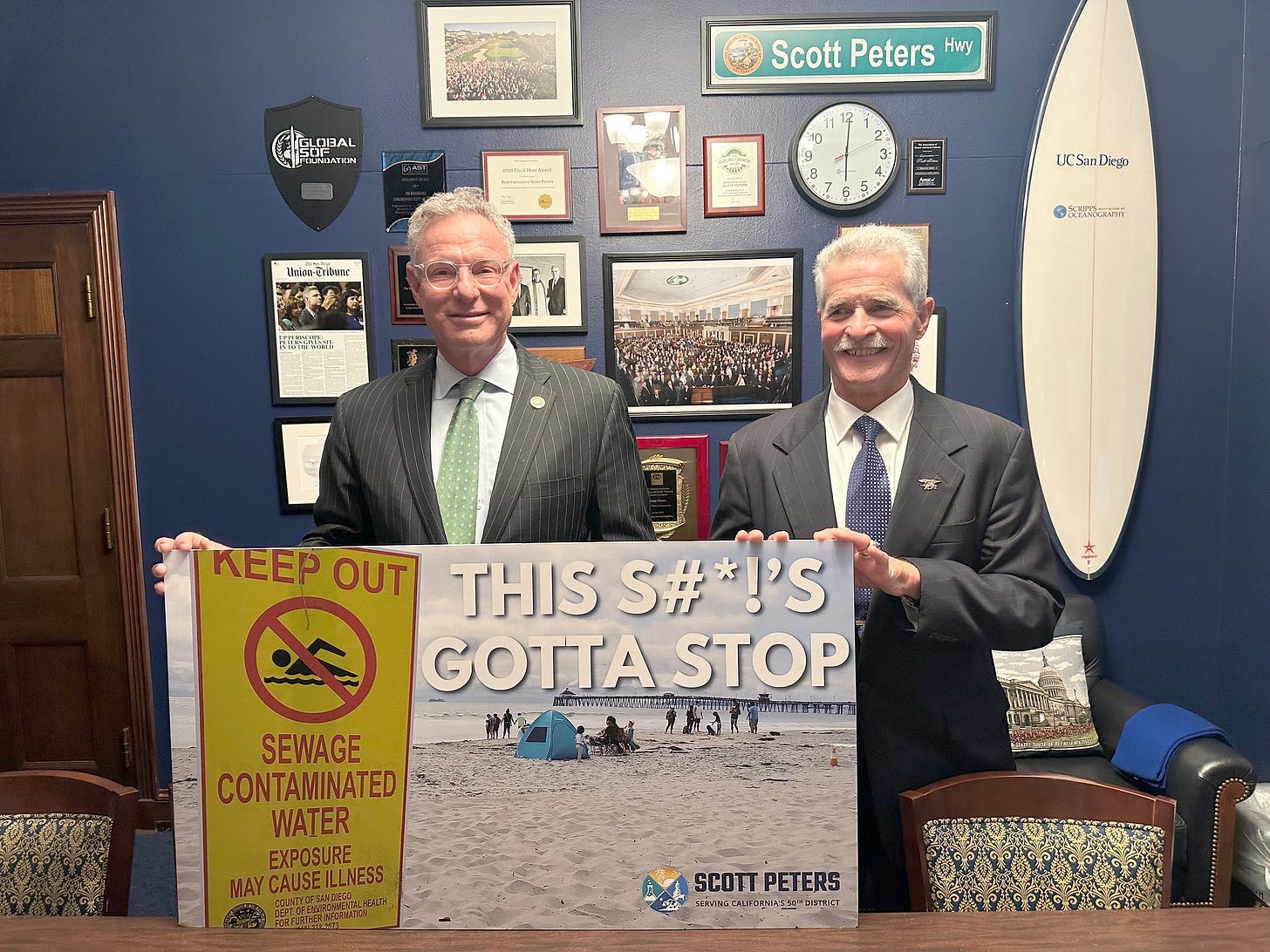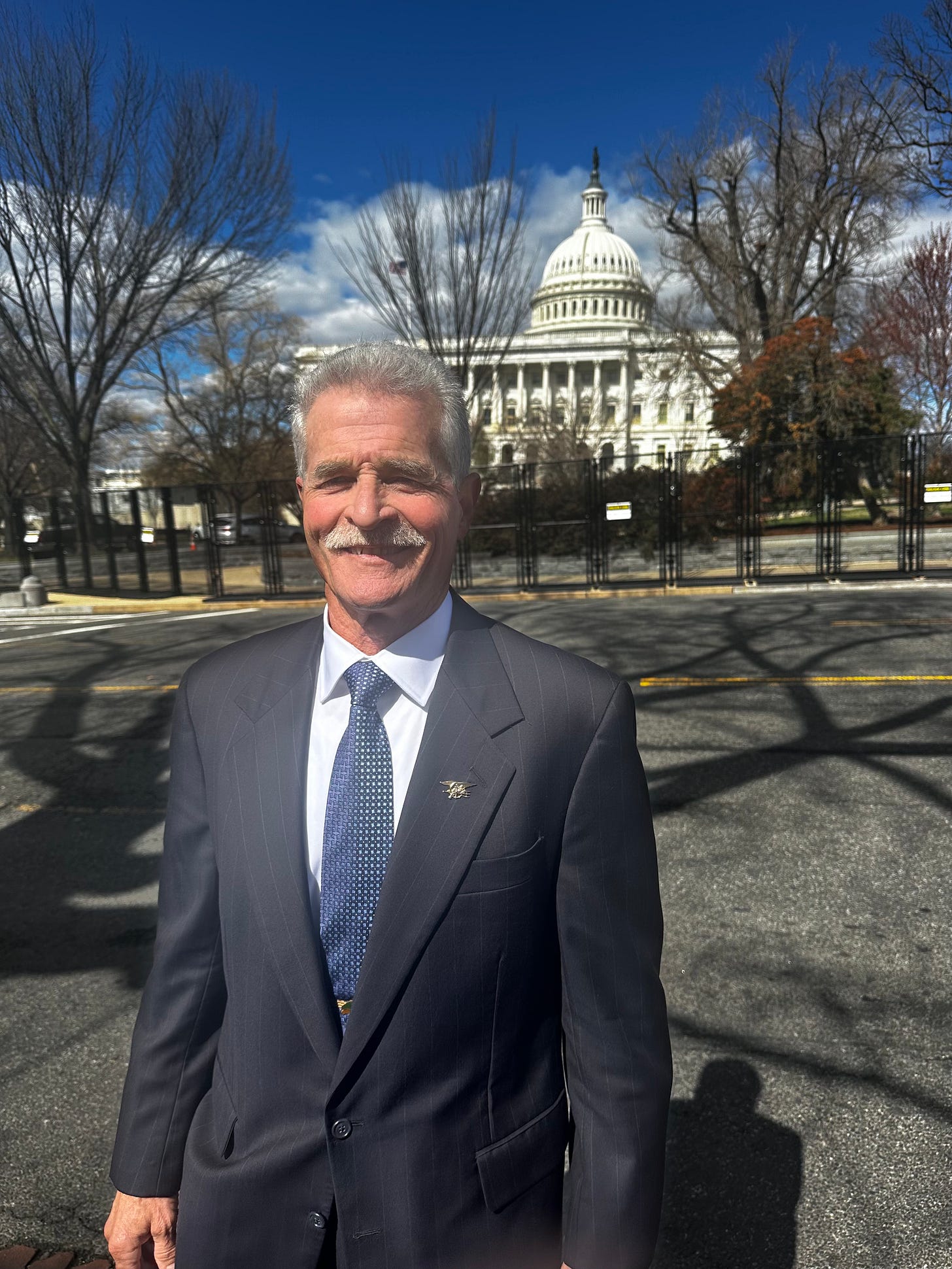
The call came Wednesday morning, Feb. 27, from a number I did not recognize. I was tempted to ignore it, but against my better judgment, I answered.
It was the office of U.S. Rep. Scott Peters calling: Would I — as a retired SEAL and former commanding officer — be willing to speak publicly about the ever-worsening cross-border sewage problem and its impact on the SEALs? And if so, would I travel to Washington, D.C., the following week to participate in interviews alongside the congressman and attend the State of the Union?
My wife, Amy, founder and president of Emerald Keepers and outspoken community environmental leader, was in the kitchen with me, punching my arm to immediately say, “YES!”
“A once-in-a-lifetime chance to draw national attention to our sewage crisis and be a voice for the SEALs? Attending the State of the Union? DO IT!!,” she exclaimed.
On March 6, Amy and I touched down at Dulles Airport, drove into the District of Columbia and the whirlwind began.
Tours of the White House and Capitol the next morning were followed by an afternoon of five in-person and ZOOM media interviews, receptions with the secretary of the Veterans Administration and the House minority leader and finally, the honor and privilege of attending the 2024 State of the Union address.
Returning to our hotel just before midnight, I was exhausted, elated and hugely impressed with the progress Peters was making both in drawing attention to the sewage crisis and building coalitions to address it. In congressional terms, that translates into allocating funds to begin fixing the decades-old problem. I hoped the SEAL cachet and my voice conveyed a reasoned, sobering message: The sewage crisis threatens the health of SEALs and other military units, directly impacting SEAL training — and training is inextricably linked to readiness. The crisis ultimately impacts U.S. economic, environmental and public health, as well as national security. The Navy and SEALs are struggling to mitigate impact of the polluted water, but it’s up to Congress to solve the sewage crisis.
Sleep didn’t come easily that night.
Asked dozens of times since the State of the Union, “What was it like? What were your impressions?” I struggle to put into words the whole experience — but I’ll try.
Each member of Congress is allocated a single guest ticket to the State of the Union, and Peters generously offered his to me. The venue — the House of Representatives chamber — is the gathering place where voting members have met since 1857 to conduct business and cast ballots. On a typical day, representatives may individually stand before cameras making statements or saunter in to cast votes. Normally, the chamber is anything but crowded.
During the State of the Union, however, the floor and galleries are overflowing. Strict protocols govern the sequence of arrival to balance ceremonial, logistical and security requirements for the event, which was scheduled to start at 9 p.m.

The evening began with members of Congress, the media and guests (who sit in the galleries) arriving and situating themselves early. Later, but still well in advance of the president’s arrival, the Joint Chiefs of Staff, Supreme Court justices and departmental secretaries casually and dignifiedly filed in. As each group made its way across the crowded chamber floor, the event fell progressively behind schedule, though few in attendance seemed to notice.
While there is less pomp than one might associate with a presidential event, the sense of gravitas, anticipation and historical significance, both past and of the moment, was palpable. For the moment, it was truly a world stage. Security was tight. Outside, the entire Capitol complex was protected by layers of temporary fencing, street closures and a significant police presence.
President Joe Biden arrived late and as seen on television, wended his way slowly to the dais down an aisle lined with well-wishers. It was nearly 9:30 by the time he began to speak, and it immediately became evident television viewers had an advantage over attendees. Whereas the president’s voice came through clearly on television, acoustics in the chamber are such that applause often obscured his words.
All proceeded well and for a brief period civility prevailed. Applause, rising to show support, and low rumbles of agreement/disagreement were par for the course. But party loyalties, ranging from rolling of eyes by party principals to outbursts from individual representatives, were soon and embarrassingly on display. Inappropriate, disruptive middle school behavior continued throughout the evening. I was reminded just how far the nation has strayed from civility, marveling yet again at how elected senior officials could tolerate such behavior.
A disruption occurred partway through the evening that I could not directly observe from my vantage point. I learned later a gold star father, who was a guest in the gallery, ignored protocol and entreaties to behave and was subsequently ushered out. While many felt empathy for the loss of his son, all guests were made aware of standards of behavior before entering the chamber to ensure decorum and security — and were expected to abide by them. I witnessed other guests who, when discreetly approached by security, desisted and were allowed to remain.
A little after 10:30 p.m. the president concluded his remarks and slowly made his way back through a surging sea of well-wishers to a well-guarded floor exit. To minimize chaos, guests in the galleries were not permitted to depart until dignitaries had exited the floor.
My takeaways from this unique and historic evening?
Article II, section 3 of the U.S. Constitution states the president “shall from time to time give to the Congress information of the State of the Union, and recommend to their consideration such measures as he shall judge necessary and expedient…” This affords a president great latitude to choose what he will emphasize. Depending on one’s perspective, Biden’s address could be construed as pandering to a party, an appeal for collaboration, a bit of both or simply exploiting the bully pulpit. I felt a measured tone was taken, articulating the condition of the nation to the nation and cajoling the senior government officials gathered in the room to work together to address the nation’s issues.
The event is undeniably political theater. But it also affords an opportunity like no other to begin salving political differences, prioritize governmental action, and heal national wounds — and even to inspire.
As a realist, I accept that the wheels of government grind slowly, often maddeningly so. As one privileged to grow up in, defend, and observe this nation from several vantage points, I came away from the State of the Union with mixed emotions. Are we, as a nation, putting at risk the “great experiment” bequeathed us by our forebearers? Will we allow forces visible and invisible, foreign and domestic, principled and unprincipled, understood and unfathomable to divide us to the point that the experiment fails?
Neither eternal optimist nor fatalist, I walked out of the Capitol late that evening with a singular observation: every citizen needs to do more to preserve for our children and grandchildren the privileges we have enjoyed. And while I did not find the speech overly inspiring, my hope is the president’s words nudge the needle reflecting our nation’s belief in itself in a positive direction. It is a nudge the nation is in dire need of.
Capt. Dan’l Steward is a retired Navy SEAL.




